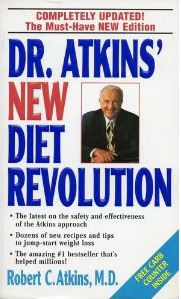Note: Everything I know about the Atkins diet comes from my Aunt--a Registered Dietitian for over 30 years--and my girlfriend, a Dietetic intern about six months away from being an RD. I can't get into the technical explanations because I don't understand them myself. In any case, the general consensus is that bits and pieces of it are sound, but depraving
MrJoshua wrote:
Why?
In short, because your body is in Ketosis all the time--that is what the diet is specifically aiming for, and it is unhealthy to be in it at all times (just for clarity's sake, that is supposed to read: It is unhealthy to be in ketosis all the time; not that it is always unhealthy to be in ketosis).
Does it still say you can have an unlimited amount of meat, eggs, butter, and animal products in general? (I know that it originally did, but it could have changed).
Something my girlfriend had downloaded on the Atkins diet on my computer about a week ago:
People with professional degrees in medicine and dietetics said:
The All-New Atkins Advantage
BOOK REVIEW
The All-New Atkins Advantage
By Stuart L. Trager, MD, with Colette Heimowitz, MSc St. Martin's Press (2007) Reviewed by Joan Salge Blake, MS, RD, LDN
Claims:
The All-New Atkins Advantage contains a 12-week, low-carbohydrate program to lose weight, achieve peak fitness and health and maximize willpower to reach your life goals.
Synopsis of the Diet Plan:
It features the Atkins weight-loss diet with a 12-week, step-by-step plan for incorporating exercise into a reader's life. The book also provides guidance to help the individual stick with the diet and exercise program. Each week builds on the one before it.
For the most part, this is the classic Atkins low-carbohydrate diet augmented with exercise guidance and some motivational tips. The book includes 12 weeks of meal plans designed to provide 20 to 80 grams of "net" carbs. (Net carbs are defined as the total grams of carbohydrates in a food minus the grams of carbohydrates from fiber.) It focuses on counting carbohydrates and touts protein as being "the mainstay of the Atkins Nutrition Approach." A multivitamin supplement is recommended and a multimineral supplement is recommended if symptoms such as leg cramps, weakness when climbing stairs, dizziness or fatigue occur during the initial phase.
Nutritional Pros and Cons:
Like the previous Atkins Diet, the first phase of the diet recommends severely limiting carbohydrates. Only 20 grams of net carbohydrates daily are allowed during this phase and it is recommended to "eat at least six ounces of protein at every meal." Acceptable foods include all cuts of meat, foul, fish, eggs, butter and three to four ounces of full-fat cheese daily. This phase can last up to six months for some people. The subsequent phases gradually add small amounts of carbohydrates to the diet. Thus, throughout the initial phase -- and potentially the entire diet -- an individual could consume less than 130 grams of carbohydrates, which is the minimum amount of carbohydrates needed daily to provide glucose for the proper brain function.
The claim that "natural fats, including saturated fats, are vital to good health" is very misleading. In essence, the amount of essential fatty acids needed by an individual is synthesized by the body, so there is no Daily Recommended Intake for saturated fat. Readers could easily interpret that as a green light for consuming saturated fats in excess amounts in the diet. This is erroneous. In fact, research supports that a diet rich in saturated fat increases the risk of coronary heart disease.
The high protein content of the plan means eating less whole grains, fruits and vegetables, which reduces the amount of vitamins, minerals, phytochemicals and fiber consumed. Additionally, the high proportion of dietary protein means eating more unhealthy saturated fat and cholesterol.
The authors recommend taking 500 to 1,000 milligrams of L-glutamine before dinner to control cravings. However, they state: "Although not much research has yet focused on L-glutamine's role in this regard, a wealth of anecdotal evidence indicates it may help stop a binge before it happens." The key word here is "anecdotal." The public shouldn't be a scientific guinea pig.
Bottom Line: I would not recommend a low-carbohydrate diet for weight loss. Americans should be following a well-balanced, plant-based diet, rich in whole grains, fruit and vegetables and low in unhealthy lipids (saturated, trans fats and cholesterol). Such a diet, if calorie controlled, can be both waist- and health-friendly and has been shown to also reduce the risk of heart disease, cancer, stroke and type 2 diabetes.












































